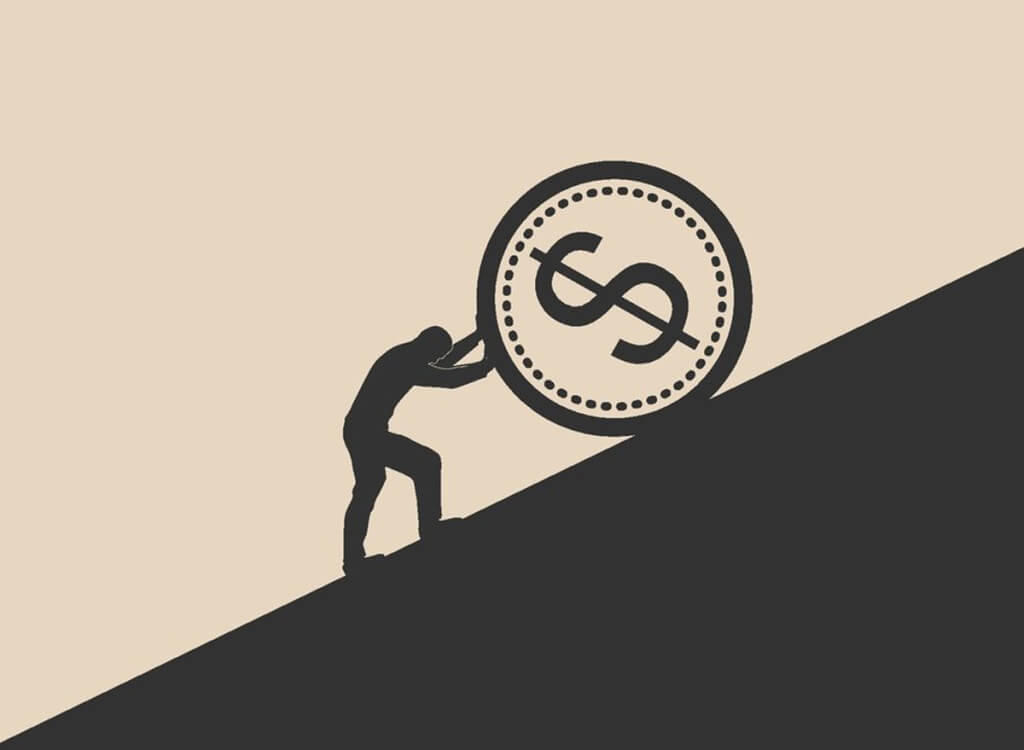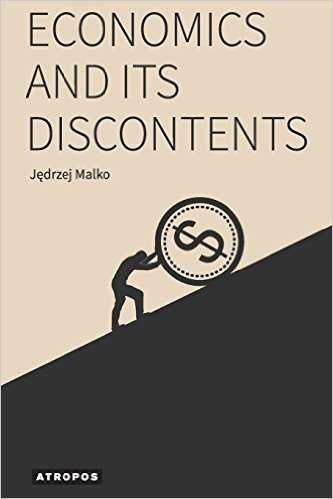If economists are so smart, why aren’t they more wealthy? If economics is a science, why did it fail to predict the global crisis of 2008? If it is not a science, what exactly is it? In the modern world, economics has acquired an almost religious aura with its specific dogmas and zealous acolytes. Malko’s book demystifies economic ideas by showing how they were born and how they have developed through the ages. Covering more than two thousand years of history, it untangles the links between economics and areas as diverse as theology, physics, the theater, and war. It describes the dangers of economic fundamentalism and offers a fresh perspective on modern debates on politics and economy.
Chapter 34: A short but important chapter which shows how economics is blind to the political nature of money and its disciplining effects. Also, a chapter in which the worthlessness of the radical notion of value is outlined.
This planet has a problem: most of the people living on it are unhappy for pretty much of the time. Many solutions were suggested for this problem, but most of these were largely concerned with the movement of small green pieces of paper, which was odd because on the whole it wasn’t the small green pieces of paper that were unhappy.
Douglas Adams
The progressing monetization of societies was accompanied by a strengthening of the conviction that money can serve as a universal equivalent, oiling the wheels of the equalizing market processes. Suspicion towards exchange value and monetary transactions in general was slowly giving way to a confidence that money is a natural and neutral medium of exchange. Moreover, often it was not even seen as value-free, but an essentially emancipatory thing. This trope can be found already in Aristotle, and in the medieval praise for geometrical systems: in economic transactions no account was to be taken of the social positions of the participants. Market not only was said to ignore them, but even actively encroached upon the petrified social relations. “All fixed, fast-frozen relations, with their train of ancient and venerable prejudices and opinions, are swept away, all new-formed ones become antiquated before they can ossify. All that is solid melts into air, all that is holy is profaned.”
It is questionable whether the market really challenges practices and discourses of domination, or whether it merely challenges traditional forms of domination only to re-implement them in a slightly changed form. And arguably, even this is achieved at the cost of exporting the heaviest economic burdens to the peripheries of the world market. In any case, it seems to be out of discussion that the new monetary exchange relations brought their own forms of discipline and subordination. And it is one to which the economic discourse is entirely blind. We have already touched upon this issue in Chapter 31. The basic premise of the new money ideology was simple: “Only if the poor are subjected to nonmonetary, juridicial forms of direct or personal domination is there any disadvantage. If, however, power over the poor arises solely out of the lesser stake that the rich have in any transaction, it is liberty.” On the one hand, individual monetary exchanges start to be perceived as politically and morally neutral or even positive. On the other, the systemic, political significance of money becomes legitimized and institutionalized. Reddy, in his terrific Money and liberty in modern Europe calls it the “liberal illusion”:
Its ingredients were the unlimited and easy substitutability of money for any other object of desire, and therefore the universality of the underlying desire for “advantage” or gain;
the political neutrality of money exchanges, and therefore the compatibility of free trade with personal liberty.
Each of these ideas so neatly entailed the others, all so plausibly turned on the apparent truth of the first principle, that the theory seemed to sum up what the essence of money is, especially in the experience of well-to-do landlords and merchants who had little contact with either production or deprivation.
The Smithian system of “natural liberty” was coherent and workable insofar as within it money answered all things. Through a series of geometrical equalizations, the market was presented as capable of synthesizing all conflicting interests, provided that money was left to perform its natural function as a medium of exchange. In Smith’s words, as long as people are allowed to pursue their interests:
The whole of the advantages and disadvantages of the different employments of labour and stock must, in the same neighbourhood, be either perfectly equal or continually tending to equality. If, in the same neighbourhood, there was any employment evidently either more or less advantageous than the rest, so many people would crowd into it in the one case, and so many would desert it in the other, that its advantages would soon return to the level of the other employments. This at least would be the case in a society where things were left to follow their natural course, where there was perfect liberty, and where every man was perfectly free both to choose what occupation he thought proper, and to change it as often as he thought proper. Every man’s interest would prompt him to seek the advantageous, and to shun the disadvantageous employment.
Thus, the purpose of the economist is to identify and remove the artificial obstacles to natural liberty. The scourge of economy is a guild, a monopoly, or a protectionist policy that doesn’t allow free circulation of goods and labor. In more general terms, it is a use of political power to disrupt and corrupt the natural economic process of equalization that would result in perfect competition. It is amusing that so many economists who praise this fantasy of perfect competition and who propose policies based on it fail to see that in a perfectly competitive market no action could ever be performed at a profit.
The obvious blind spot of this approach is that it fails to grasp that economic wealth is already a form of political power. They are not two distinct realms that can be opposed to each other. Property laws are nothing other than regulations of access to the apparatus of state violence. Debt, property, money, they are all institutions, thus wealth is a form of power – this is true by definition, it’s a tautology. There can be no natural economic exchange free from power asymmetry because economic exchange is the very articulation of power asymmetry. Reddy calls upon the history of ending serfdom in Prussia to illustrate this point:
The outcome in Prussia was utterly different from what the reformers had envisioned. […] [It had been] promised in 1811 that “the state would thus acquire a new, estimable class of motivated property owners” and that “through the desire to enter this class, the cultivation of the soil would profit from more hands, and through their greater effort, because freely given, more work as well.” Up to 1848, in fact, roughly 350,000 peasants did gain ownership of some land in Prussia, although compensation payments and indebtedness made their position precarious and many now had to depend on wage labor to supplement the yield of their own meager acres. Even worse, the number of rural landless laborers in Prussia in the meantime tripled, reaching well over a million. Hope of gaining access to land ownership was for this group nil; their insecurity was extreme in the best of times. […] Prussian reformers thought they were liberating serfs; in fact they were merely altering the disciplinary potentials within which serfs could be made to continue obeying their betters.
What is fascinating and of utmost importance is that Marx’s economics followed a very similar route. In his Capital, money “radical leveller that it is, does away with all distinctions” and works as a neutral medium of exchange. The Marxist critique attacks the specific crimes of the capitalist mode of production but treats the market mechanism as such as an equalization machine that is almost never mistaken. The whole edifice of Marxist economics can be treated as a quest for an identification of the mechanism that corrupts this objective process of equalization. Capitalist exploitation is said to be precisely this: an unequal exchange, theft of worker’s labor, of “a definite quantity of human muscle, nerve, brain etc.” that is unlawfuly taken from laborers.
This critique is made possible by the labor theory of value – a concept that economic value is produced by labor. Historically, in pre-Christian European societies where economy wasn’t sustained either by slavery or serfdom, the connection between labor and the right to its produce was often seen as self-evident. In feudal Europe it came to be considered a radical and subversive idea, at odds with the feudal regime of property, and when it was voiced again in the seventeenth century by Locke, it still had that character. Only then, it didn’t just challenge the feudal social structure but it simultaneously legitimized a new commercial economy. For a whole generation of classical economists the labor theory of value was a cornerstone of their theory, providing a legitimization for a transition from manorial to market economy. Marx followed this tradition and embarked on a journey in the search of lost value. In Capital he showed how value that is produced by laborers is then appropriated by the capitalists. The laborers have a bigger share in the production than they are remunerated for, and the objective rate of this disproportion, “the rate of exploitation,” can be expressed by a mathematical formula. This approach treats value is an objective, innate quality of the produced good. Individual labor is, of course, put in the context of the whole economy and the “social organization of production,” but ultimately, it can be said to produce a certain measurable value, and whenever his employer appropriates a share of this value, the individual laborer is exploited. This is the “physiological truth.” Robinson wrote:
Voltaire remarked that it is possible to kill a flock of sheep by witchcraft if you give them plenty of arsenic at the same time. The sheep, in this figure may well stand for the complacent apologists of capitalism; Marx’s penetrating insight and bitter hatred of oppression supply the arsenic, while the labour theory of value provides the incantations.
Perhaps an entirely different approach to value would be more fruitful. One that would see it not as an inherent feature of traded goods and services, but in social, relational, inter-subjective terms. Values are neither produced in factories and equalized in the process of exchange, nor are they independently assigned by individuals expressing their autonomous preferences (like the marginalists believe). They are established in a series of exchanges, as differences. And these exchanges are by no means natural equalizations of different values. And they don’t have to be peaceful. Usually they aren’t. They are simply brutal (if discreet) executions of power.
![Political Critique [DISCONTINUED]](http://politicalcritique.org/wp-content/uploads/2015/09/Political-Critique-LOGO.png)
![Political Critique [DISCONTINUED]](http://politicalcritique.org/wp-content/uploads/2015/09/Political-Critique-LOGO-2.png)


Better to read the book from the beginning. It has a cumulative effect that is stunning and eye-opening. It takes the reader step by step from the ancients to where we are today.